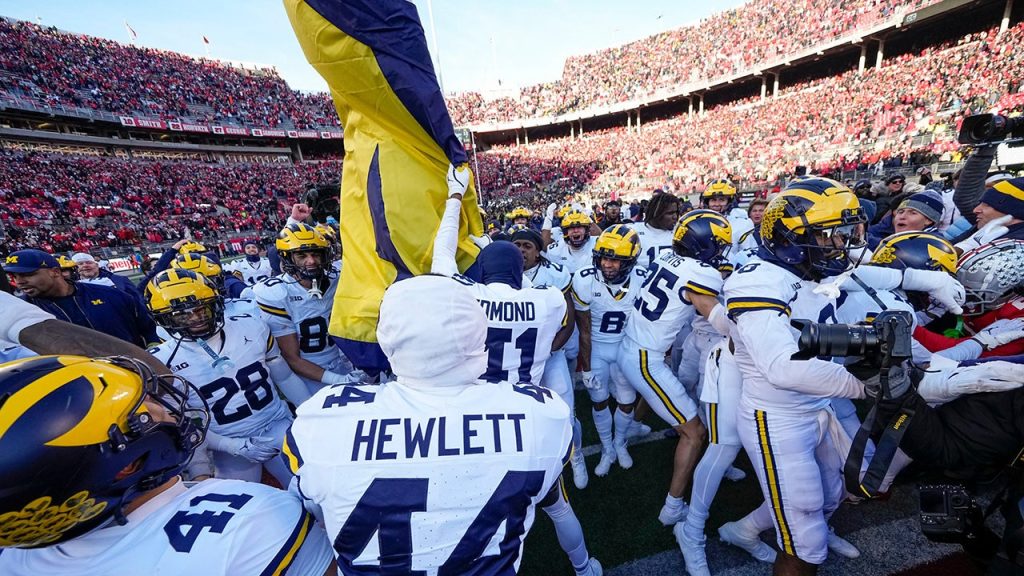The post-game melee that erupted following Michigan’s upset victory over Ohio State on November 30, 2024, sparked a wave of controversy and disciplinary action, culminating in a proposed Ohio law that aims to criminalize the act of planting a flag on the Ohio Stadium field. The incident, triggered by Michigan players attempting to plant a flag on the Ohio State logo at midfield, quickly escalated into a brawl involving players from both teams, necessitating the intervention of law enforcement officials who deployed pepper spray to quell the escalating tensions. This on-field altercation prompted a strong response from both the Big Ten Conference and an Ohio state representative, highlighting the perceived seriousness of the breach of sportsmanship.
The central point of contention revolves around the act of flag planting, a symbolic gesture of victory that, in this instance, ignited a heated confrontation. Michigan players, celebrating their hard-fought win over their arch-rivals, attempted to stake their claim on Ohio State’s home turf by planting their flag on the iconic OSU logo at midfield. This act, perceived by Ohio State players as a provocative display of disrespect, triggered an immediate and aggressive response. The ensuing brawl involved numerous players from both teams, creating a chaotic scene that required intervention from law enforcement personnel.
The authorities’ use of pepper spray to disperse the fighting players underscores the intensity of the situation. While effective in breaking up the brawl, the pepper spray also affected Michigan players, who were seen rubbing their eyes in response to the chemical irritant. This incident, captured on video and widely circulated on social media, quickly became a focal point of discussion and debate regarding sportsmanship, rivalry, and the appropriate response to such displays of aggression.
The Big Ten Conference, recognizing the severity of the incident and its potential to tarnish the image of collegiate athletics, imposed significant financial penalties on both universities. Each institution was fined $100,000 for violating the conference’s sportsmanship policy. The Big Ten’s statement accompanying the fines emphasized the importance of respect and civility in athletic competition, condemning the actions of both teams for jeopardizing the safety of participants and bystanders. This disciplinary action reflects the conference’s commitment to upholding standards of conduct and deterring future incidents of this nature.
Taking the response a step further, Ohio state Rep. Josh Williams introduced the “O.H.I.O. Sportsmanship Act,” a bill specifically designed to outlaw the act of planting a flag on the Ohio Stadium field during college football games. The proposed legislation underscores the seriousness with which some view the flag-planting incident, elevating it from a breach of sportsmanship to a potential criminal offense. If passed, the law would make flag planting a fifth-degree felony, punishable by jail time and fines. This proposed legislation has ignited debate about the appropriate balance between celebrating victory and respecting opponents, as well as the role of law enforcement in regulating on-field behavior.
The incident and its aftermath have prompted broader discussions about the nature of sports rivalries, the importance of sportsmanship, and the appropriate ways to celebrate victory. While the desire to express triumph is understandable, the events at Ohio Stadium highlight the potential for celebratory acts to escalate into conflict, particularly in highly charged rivalry games. The proposed legislation and the Big Ten’s response serve as stark reminders of the importance of maintaining respect and civility, even in the heat of competition. The incident also raises questions about the role of universities in instilling sportsmanship values in their athletes and the responsibility of coaches and officials to maintain control and prevent such incidents from occurring. The fallout from this single act of flag planting will likely continue to resonate throughout the collegiate sports landscape, prompting further reflection on the delicate balance between celebrating victory and upholding the principles of fair play and sportsmanship.










